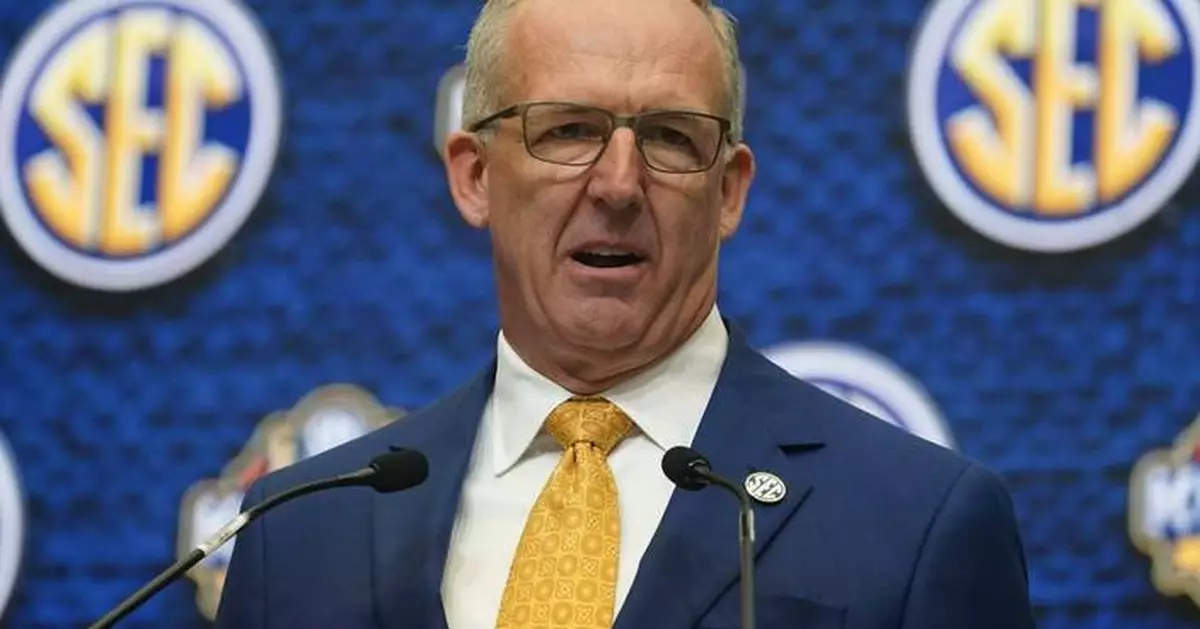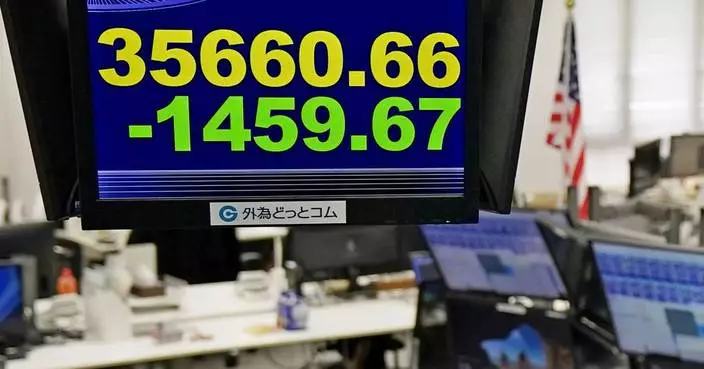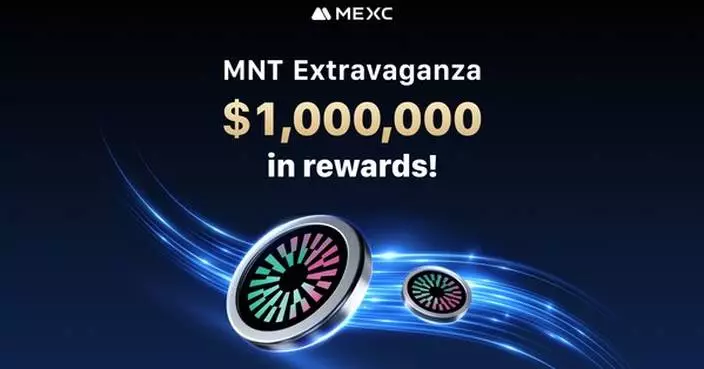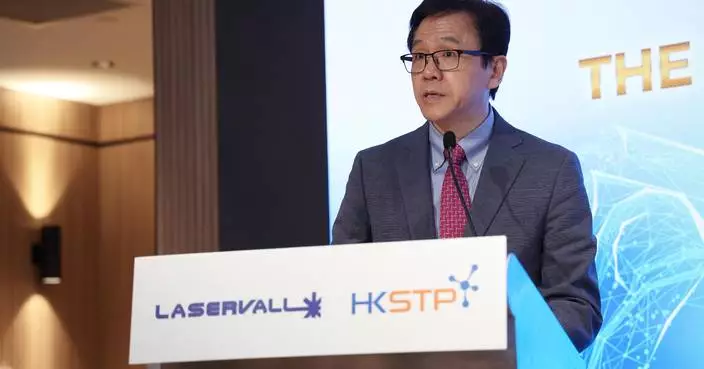DESTIN, Fla. (AP) — Frustrating meetings for the College Football Playoff and at the NCAA convention earlier this year led Southeastern Conference Commissioner Greg Sankey to try to look for a way to seek solutions for issues facing college sports within smaller groups.
“So afterwards, traveling home, like, you know, we have some really big problems,” Sankey said Thursday as he wrapped up four days of SEC spring meetings. “And it didn’t seem to me that we were working to solve even some of the medium problems. And we weren't even talking in some of those rooms about the really big problems.”
Sankey called Big Ten Commissioner Tony Petitti upon his return home, a call that led to the SEC and Big Ten forming a joint advisory committee between college sports' two wealthiest and most powerful conferences.
“I have thought for a long period of time that if the two conferences could agree that you could fulfill a leadership responsibility,” Sankey said.
During his last of four briefing with reporters, and less than a week after the NCAA and five power conferences agreed to a $2.8 billion antitrust settlement, Sankey said he still believes a large Division I can work as college sports heads toward sweeping changes.
But, he added: “This is not like the lightning strike moment, but the realization you’re not going to solve the big problems in big rooms filled with people, because the realities are so different across Division I.”
NCAA Division I is comprised of 352 schools, with a vast array of sizes, budgets and priorities. Most Power Five conferences schools, like those in the SEC, have athletic budgets well over $100 million annually.
Those power conferences, plus the NCAA, are the defendants in several class-action antitrust lawsuits. The NCAA and conferences agreed to a proposed settlement last week that not only pays out nearly $3 billion in damages to former and current athletes, but comes with an agreement that schools will soon be permitted to share tens of millions of dollars in revenue with athletes annually.
How the SEC will handle the settlement and build a new compensation system for its athletes was a major topic this week, though Sankey said these meetings were more about discussions than decisions.
The settlement still needs to be approved by a judge, with more detailed terms still being fleshed out.
Sankey said the lucrative NCAA men's basketball tournament — which accounts for the vast majority of the association's more than $1 billion in revenue — is what binds a diverse membership, but he re-iterated some modification of March Madness is likely necessary.
“We’ve allowed Division I to grow,” he said. “We have conferences solving their membership problem by inviting non-Division I members in, but we haven’t modified the bracket size. I think common sense says you have to dig into that. There are competitive issues, there are calendar issues, there are economic issues. But I do think that March can be kept together. That doesn’t mean it stays exactly the same."
Sankey said the Big Ten-SEC advisory committee has no meetings on the calendar, but expects that to change soon.
“We’re going to have to make independent decisions on a number of key things,” he said. “We can’t solve every problem together, otherwise you reintroduce antitrust concerns."
He added: "We also have to draw people in, so it’s not like two votes change the world. Certainly two conferences agreeing on things and in the right sort of way have influence.”
Follow Ralph D. Russo at https://twitter.com/ralphDrussoAP
AP college football: https://apnews.com/hub/college-football
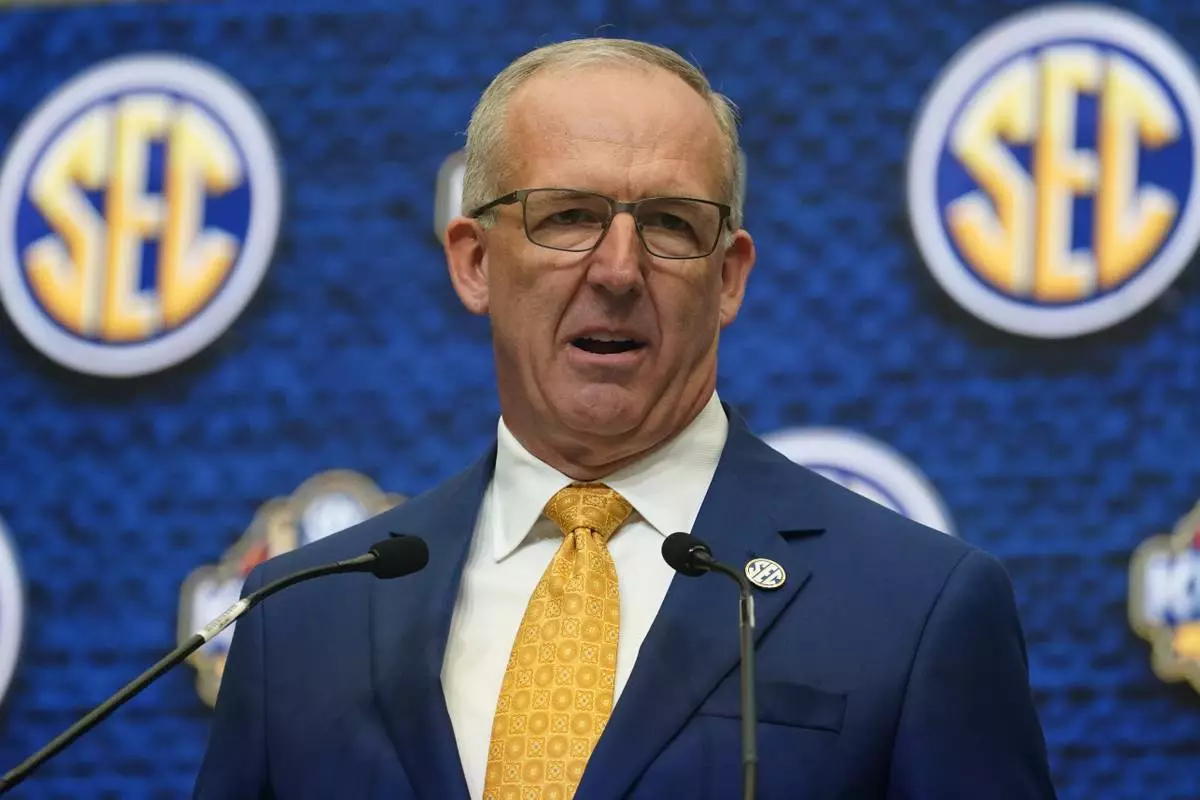
FILE - Southeastern Conference Commissioner Greg Sankey speaks during SEC football media days, July 18, 2022, in Atlanta. The NCAA and the nation's five biggest conferences have agreed to pay nearly $2.8 billion to settle a host of antitrust claims,a monumental decision that sets the stage for a groundbreaking revenue-sharing model that could start directing millions of dollars directly to athletes as soon as the 2025 fall semester. (AP Photo/John Bazemore, File)
President Donald Trump said “I’m not joking” about trying to serve a third term, the clearest indication he's considering ways to breach a constitutional barrier against continuing to lead the country after his second term ends at the beginning of 2029. “There are methods which you could do it,” Trump said in a telephone interview Sunday with NBC News from Mar-a-Lago, his private club.
The 22nd Amendment, added to the Constitution in 1951 after President Franklin D. Roosevelt was elected four times in a row, says “no person shall be elected to the office of the President more than twice.”
Here's the latest:
Calls from the U.S. to Roustan Hockey headquarters in Canada in recent weeks have been anything but routine, as bulk orders of name-brand sticks have suddenly become complicated conversations.
“These customers want to know: When their orders ship, will they have to pay an additional 25% tariff? And we respond by saying, ’Well, right now we don’t know, so they postpone their order or cancel their order because they want to know before they order what the cost is going to be,” said Graeme Roustan, who owns the company that makes and sells more than 100,000 hockey sticks annually to the U.S. market.
The prospect of 25% tariffs by Trump on Canadian imports, currently paused for some goods but facing full implementation Wednesday, has caused headaches if not havoc throughout the commercial ecosystem. The sports equipment industry is certainly no exception, with so many of the products manufactured for sports -loving Americans outside the U.S.
▶ Read more about the effects of possible tariffs on the price of sporting goods
U.S. immigration officials are asking the public and federal agencies to comment on a proposal to collect social media handles from people applying for benefits such as green cards or citizenship, to comply with an executive order from Trump.
The March 5 notice raised alarms from immigration and free speech advocates because it appears to expand the government’s reach in social media surveillance to people already vetted and in the U.S. legally, such as asylum seekers, green card and citizenship applicants – and not just those applying to enter the country. That said, social media monitoring by immigration officials has been a practice for over a decade, since at least the second Obama administration and ramping up under Trump’s first term.
▶ Read more about what the new proposal means and how it might expand social media surveillance
Elon Musk gave out $1 million checks on Sunday to two Wisconsin voters, declaring them spokespeople for his political group, ahead of a Wisconsin Supreme Court election that the tech billionaire cast as critical to President Donald Trump’s agenda and “the future of civilization.”
Musk and groups he supports have spent more than $20 million to help conservative favorite Brad Schimel in Tuesday’s race, which will determine the ideological makeup of a court likely to decide key issues in a perennial battleground state.
A unanimous state Supreme Court on Sunday refused to hear a last-minute attempt by the state’s Democratic attorney general to stop Musk from handing over the checks to two voters, a ruling that came just minutes before the planned start of the rally.
Two lower courts had already rejected the legal challenge by Democrat Josh Kaul, who argues that Musk’s offer violates a state law.
▶ Read more about Musk in Wisconsin
The group of Democrats, most of whom serve as their state’s top election official, is telling Congress the legislative proposal to add a proof of citizenship requirement when registering to vote could disenfranchise voters and upend election administration.
On Monday, the House Rules Committee is expected to consider the Safeguard American Voter Eligibility Act, known as the SAVE Act, which would require proof of citizenship to register to vote. The letter signed by 15 secretaries of state was sent Friday.
Voting by noncitizens is rare, but Republicans say any instances undermine public confidence. Last week, President Trump directed, among other things, an update to the federal voter registration form to require proof of citizenship. Legal challenges are expected.
In the letter, Democrats say it’s the “job of election officials to verify the eligibility of citizens to cast a ballot, not the job of citizens to convince the government that they are eligible to exercise their right to vote.”
Trump says Wednesday will be “Liberation Day” — a moment when he plans to roll out a set of tariffs that he promises will free the United States from foreign goods.
The details of Trump’s next round of import taxes are still sketchy. Most economic analyses say average U.S. families would have to absorb the cost of his tariffs in the form of higher prices and lower incomes. But an undeterred Trump is inviting CEOs to the White House to say they are investing hundreds of billions of dollars in new projects to avoid the import taxes.
It is also possible that the tariffs are short-lived if Trump feels he can cut a deal after imposing them.
“I’m certainly open to it, if we can do something,” Trump told reporters. “We’ll get something for it.”
At stake are family budgets, America’s prominence as the world’s leading financial power and the structure of the global economy.
▶ Read more about what you should know regarding the impending trade penalties
Trump will sign executive orders twice today, first at 1 p.m. ET and again at 5:30 p.m. ET, according to the White House.
Immigration remains a strength for Trump, but his handling of tariffs is getting more negative feedback, according to a poll from The Associated Press-NORC Center for Public Affairs Research.
About half of U.S. adults approve of Trump’s approach to immigration, the survey shows, but only about 4 in 10 have a positive view of the way he’s handling the economy and trade negotiations.
The poll indicates that many Americans are still on board with Trump’s efforts to ramp up deportations and restrict immigration. But it also suggests that his threats to impose tariffs might be erasing his advantage on another issue that he made central to his winning 2024 campaign.
Views of Trump’s job performance overall are more negative than positive, the survey found. About 4 in 10 U.S. adults approve of the way Trump is handling his job as president, and more than half disapprove.
▶ Read more about the findings from the poll
Trump said Sunday that “I’m not joking” about trying to serve a third term, the clearest indication he is considering ways to breach a constitutional barrier against continuing to lead the country after his second term ends at the beginning of 2029.
“There are methods which you could do it,” Trump said in a telephone interview with NBC News from Mar-a-Lago, his private club.
He elaborated later to reporters on Air Force One from Florida to Washington that “I have had more people ask me to have a third term, which in a way is a fourth term because the other election, the 2020 election was totally rigged.” Trump lost that election to Democrat Joe Biden.
Still, Trump added: “I don’t want to talk about a third term now because no matter how you look at it, we’ve got a long time to go.”
▶ Read more about Trump’s comments on a third term
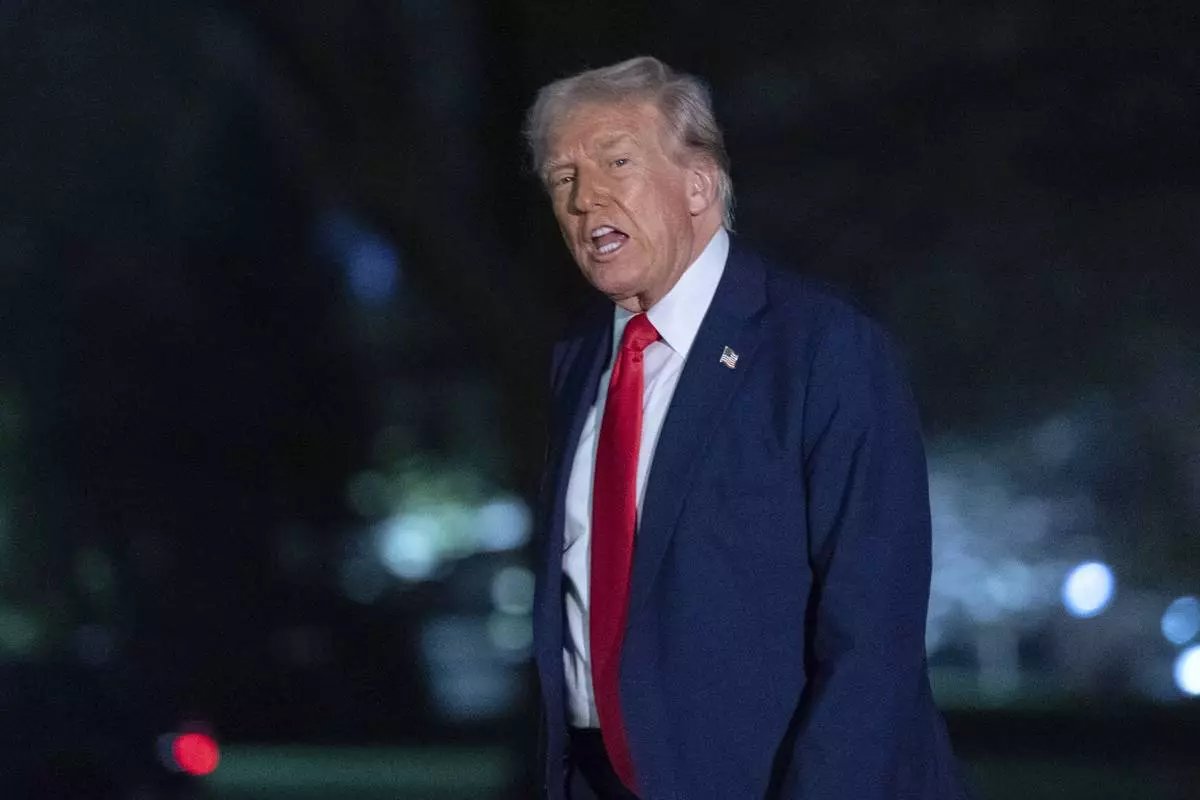
President Donald Trump talks to reporters as he walks on the South Lawn of the White House, in Washington, Sunday, March 30, 2025. (AP Photo/Jose Luis Magana)
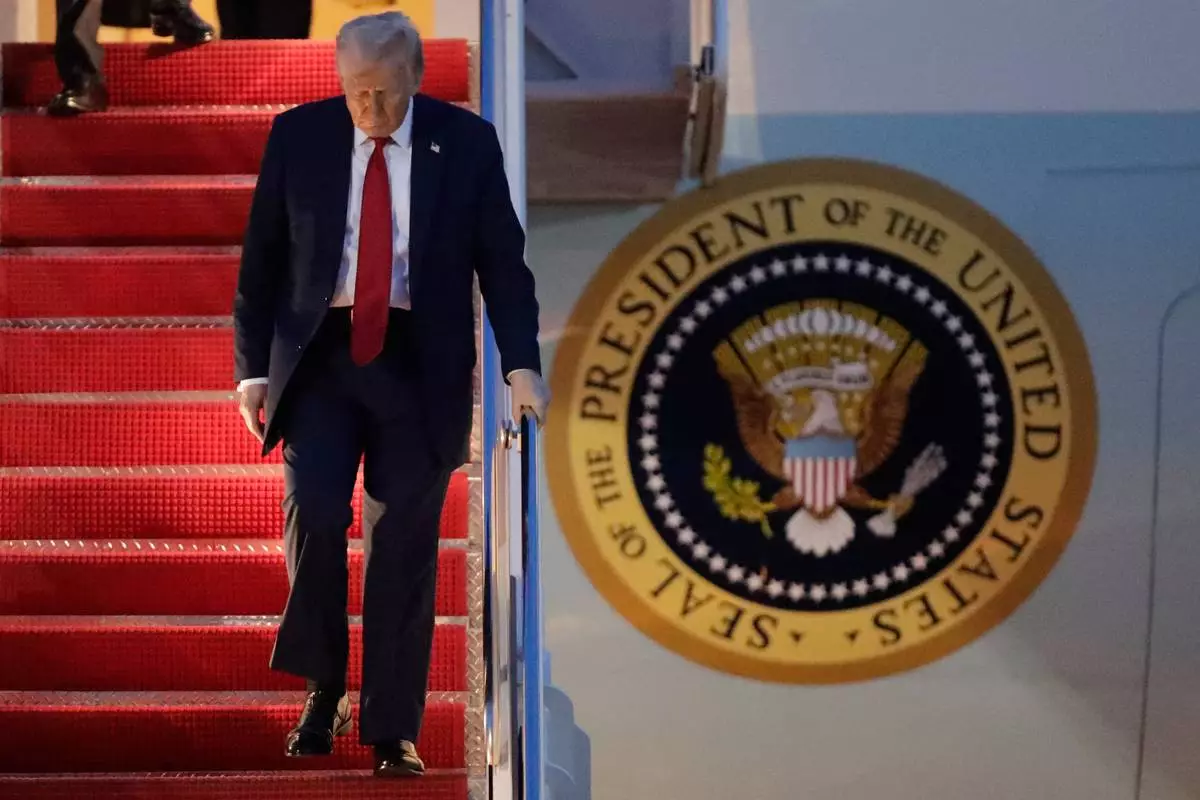
President Donald Trump walks down the stairs of Air Force One upon his arrival at Joint Base Andrews, Md., Sunday, March 30, 2025. (AP Photo/Luis M. Alvarez)



